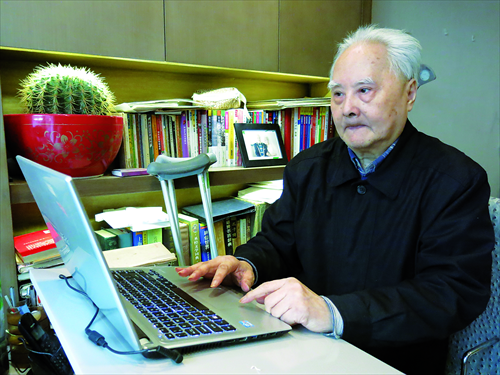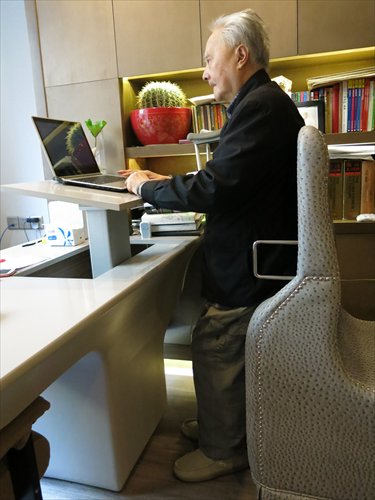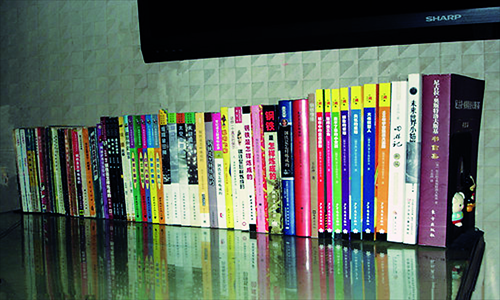Tempered steel
Translator overcomes disability to bring tale of triumph over adversity to the masses
Most great writers and translators spend days and nights at their desks, toiling to accomplish great masterpieces. But self-educated Wang Zhichong (pictured), one of the most accomplished Russian-Chinese translators in China, has put in the same kind of hours over the past 50 years while standing at his desk or even lying in his bed, due to a crippling disease.
The 78-year-old Shanghainese translator and writer has translated and written around 60 books this way. He is best known for his Chinese translation of How the Steel Was Tempered, written by the Soviet socialist realist writer Nikolai Ostrovsky. Wang made the novel more readable for juveniles with his simple and lean translation style.

A portrait of Shanghai translator Wang Zhichong at work Photos: Du Qiongfang/GT and courtesy of Wang Zhichong
Besides his books, his refusal to surrender in the face of his difficulties, along with his positive attitude despite his setbacks, also serve to encourage youngsters.
At the age of 15, Wang was diagnosed with ankylosing spondylitis, which means he cannot bend his body to sit up or to walk. Except for his arms, he cannot move his body. He can only lie on the bed or stand on his feet, keeping his body straight. The condition meant he had to drop out of school during his third year of junior high school at Gezhi High School, a key school in Huangpu district.
Today, the white-haired translator has a kind and happy face, and a peaceful smile. There is no self-pity in his expression. Every day, he translates and writes at a specially made desk that can be elevated to the height of his chest while he stands. Before he became afflicted by his condition, he had never expected to make a living with foreign languages. English was his poorest subject.
The accomplished disabled translator has received many awards and honors for his contribution to children's literature, and his efforts to overcome huge difficulties. He says he dedicates his accomplishments to the people in his life who helped him to stand up again.
One of them was a teacher of his from Gezhi High School named Tang Tinggao. Soon after Wang's diagnosis, Tang visited him and brought him several books. One of them was How the Steel Was Tempered. Wang was greatly encouraged by the novel's hero, who is also disabled. Tang suggested that Wang listen to the radio to pass the time. Wang discovered a Russian teaching program.

A portrait of Wang Zhichong at work
He listened to the program and did the exercises again and again every day. Whenever he encountered problems in his studies, he wrote to the teachers of the program. "The teachers answered all my letters and tried every means to help me master the language," said Wang.
Wang studied for two years, then took the graduation exam. Since he could not go to the exam venue, the broadcasting school sent a teacher to his home to oversee him taking the exam. "Finally I got the precious graduation certificate that I treasure a lot. These people were so nice to me, but I never knew their names," said Wang. After that, Wang started trying to translate children's and folk literature. His first translation was published in 1962.
Wang met his wife, Zheng Yi, through Tang. Zheng Yi taught at the school, and Tang suggested she invite Wang to give a talk in one of her classes.
Besides taking care of Wang, Zheng also served as a sounding board for Wang while he was working on translations. Her experience teaching young children meant she could help him hit the right tone when translating books for children. She also transcribed Wang's handwriting to make it clear - a lot of it was hard to read as he had written it while lying on his bed. The manuscripts of his books kept at the Shanghai Municipal Archives are all in Zheng Yi's hand.
During times of depression and frustration, Wang would return to the Chinese version of How the Steel Was Tempered, and ponder the words and sentences of the original Russian version. Those sentences full of wisdom encouraged Wang to persist to his work.
In 1998, Wang's translation of How the Steel Was Tempered was published. So far, 200,000 copies have been printed, making it one of the most popular and widely circulated Chinese translations of the novel.
"As far as I know, there are around 100 different Chinese translations of this novel. The most famous and influential version was translated by Mei Yi in 1942. It is difficult to judge which versions are the most successful among so many translations," said Wang modestly.
Nikolai Ostrovsky suffered from typhus and rheumatism, and in the later years of his life, he could not move and was blind - which is when he wrote How the Steel Was Tempered.

The publications of Wang Zhichong
"The difference between my translation and others is that I am also disabled, so I have the same personal experiences as the author that other translators don't have. Before I translated this novel, I had been working on children's literature. My language is simple, clean and smooth, which juveniles can understand," Wang said.
He said the novel inspires readers with its progressive ideas and positive energy.
"I will concentrate on studying the author and the novel for the rest of my life to make more contributions to society," said Wang.